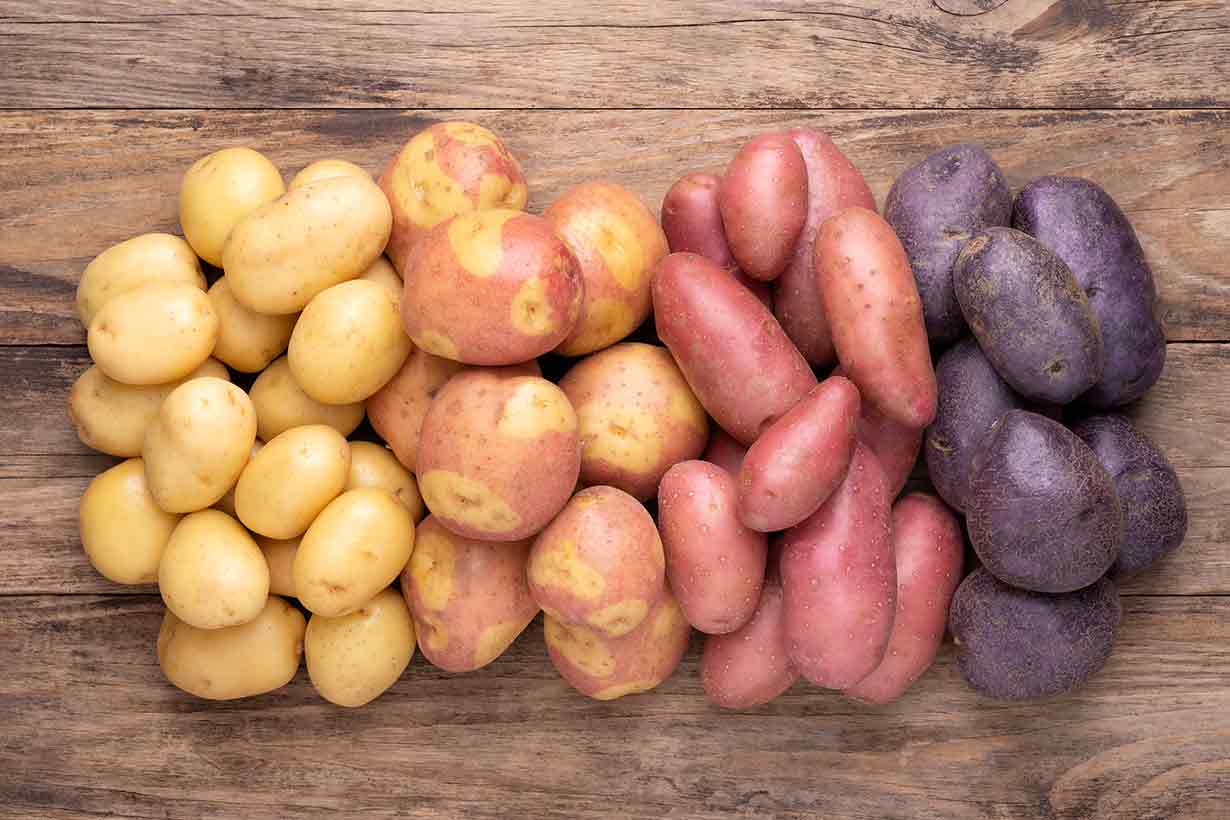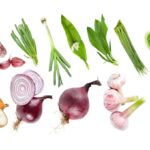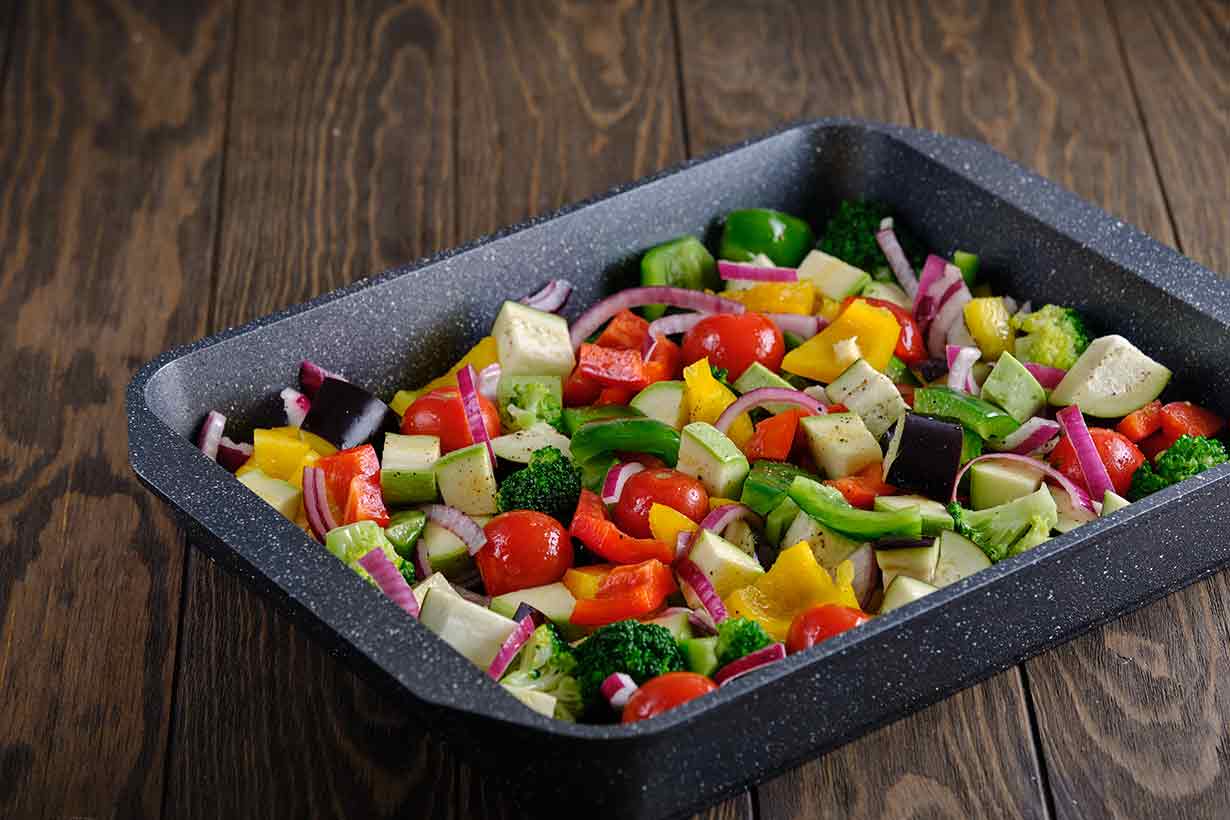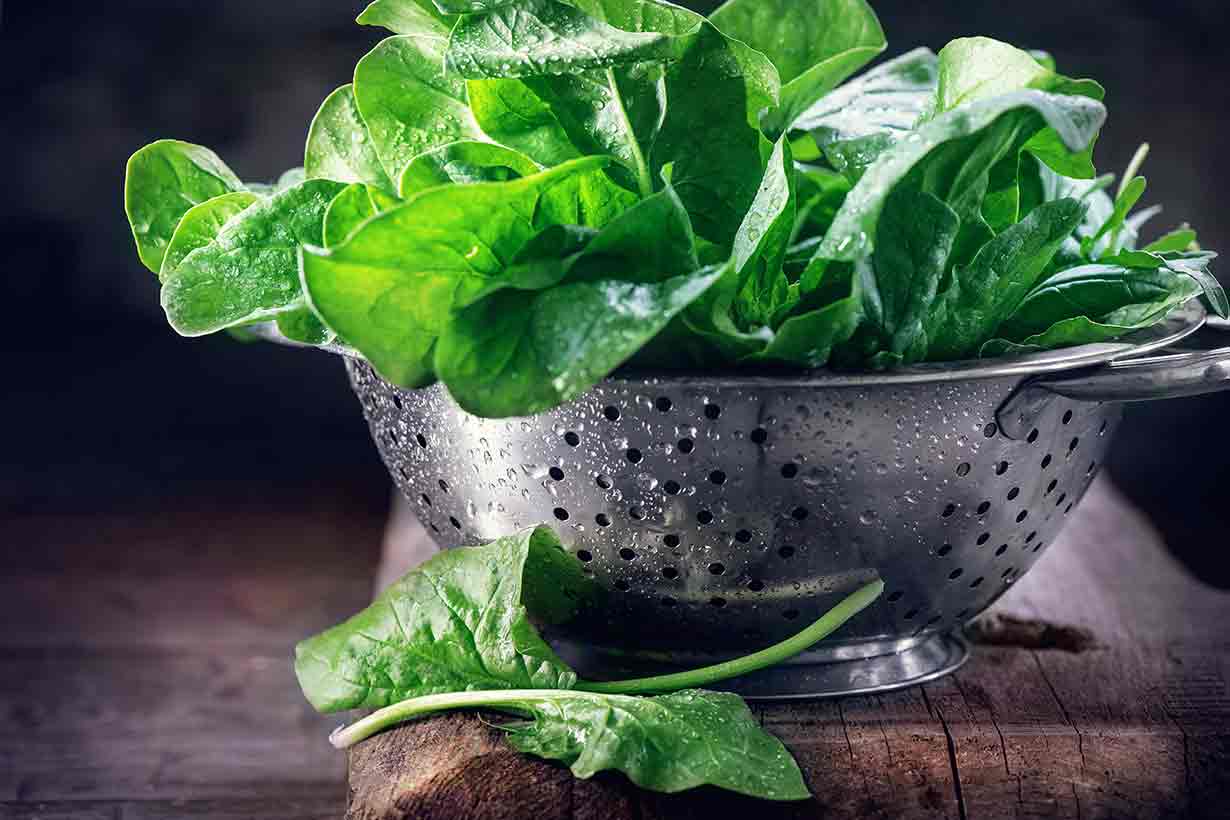
Seaweed is one of the most nutrient-rich vegetables.
For most people, sea vegetables such as kelp play a minimal role in the diet.
However, including sea vegetables in our diet may have several advantages.
This article looks at the health benefits of kelp, an edible seaweed with an abundance of beneficial compounds.
What is Kelp?
Kelp is a sea vegetable; a type of seaweed that belongs to the brown algae family.
The rather scientific name for this brown algae family is ‘Phaeophyceae,’ and they are multicellular marine algae (1).
The brown color comes from the fucoxanthin content, which is a type of xanthophyll (brown pigment) phytonutrient found in plants (2).
Kelp features heavily in Asian cuisine, and it is a dietary staple in many countries–especially in Japan (kombu) and Korea (dasima).
Unlike land vegetables, vegetation from the sea offers some unique compounds not found anywhere else.
Nutrition Facts
Kelp has some impressive nutritional benefits; it’s full of essential vitamins, minerals, amino acids, and also offers some unique phytochemicals.
In fact, kelp provides a source of almost every vitamin and mineral except the vitamin B family.
The following table shows an overview of the nutritional profile (3, 4).
| Calories/Nutrient | Amount | |
|---|---|---|
| Calories | 43 kcal | |
| Carbohydrate | 9.57 g | |
| Fiber | 1.30 g | |
| Sugars | 0.60 g | |
| Fat | 0.56 g | |
| Saturated Fat | 0.25 g | |
| Monounsaturated Fat | 0.10 g | |
| Polyunsaturated Fat | 0.05 g | |
| Omega-3 Fatty Acids | 0.01 g | |
| Omega-6 Fatty Acids | 0.03 g | |
| Protein | 1.68 g | |
| Vitamins | Amount | % DV |
| Vitamin K | 66.0 mcg | 55 % |
| Folate | 180.0 mcg | 45 % |
| Pantothenic Acid (B5) | 0.64 mg | 12.8 % |
| Riboflavin (B2) | 0.15 mg | 11.5 % |
| Vitamin E | 0.87 mg | 5.8 % |
| Thiamin (B1) | 0.05 mg | 4.2 % |
| Vitamin C | 3.0 mg | 3.3 % |
| Choline | 12.8 mg | 2.3 % |
| Vitamin A | 5.83 mcg RAE | 0.7 % |
| Pyridoxine (B6) | 0.01 mg | 0.6 % |
| Niacin (B3) | 0.47 mg | 0.3 % |
| Minerals | Amount | % DV |
| Magnesium | 121.0 mg | 28.8 % |
| Iron | 2.85 mg | 15.8 % |
| Copper | 0.13 mg | 14.4 % |
| Calcium | 168.0 mg | 12.9 % |
| Zinc | 1.23 mg | 11.2 % |
| Sodium | 233.0 mg | 10.1 % |
| Manganese | 0.20 mg | 8.7 % |
| Phosphorus | 42.0 mg | 3.4 % |
| Potassium | 89.0 mg | 1.9 % |
| Selenium | 0.7 mcg | 1.3 % |
As shown in the above nutritional data, kelp is particularly high in vitamin K, B vitamins, magnesium, iron, copper, and calcium.
Phytonutrients in Kelp
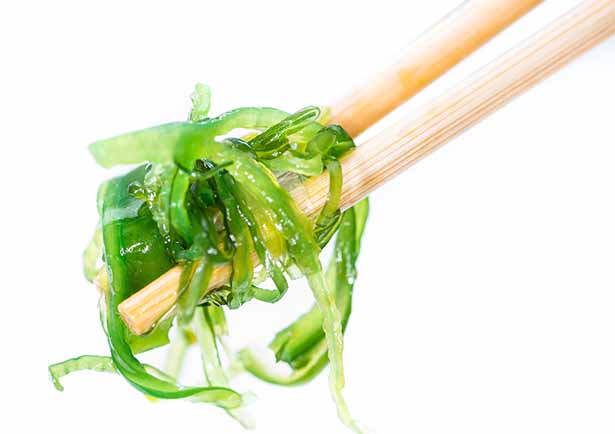
Phytonutrients are potentially health-supportive compounds found in food – you may have heard them mentioned in discussions over chocolate, wine, and blueberries (6).
Interestingly, some of these compounds found in marine vegetation are unique and cannot be found in other foods.
Here are some of the most significant:
Fucoidan
Fucoidan is a starch-like long-chain sugar, also known as a sulfated polysaccharide.
- Early cell studies show that the compound has potent anti-cancer and anti-tumor properties, which are under investigation as a potential cancer treatment. However, evidence from human clinical trials is not currently available (7, 8, 9).
- Fucoidan appears to be good for cardiovascular health. It is protective of endothelial function, can reduce blood pressure and prevents vascular dysfunction in rat studies (10, 11, 12).
- Based on controlled clinical trials in humans, fucoidan also exerts an influence on insulin secretion and may reduce the risk of developing diabetes (13, 14, 15).
Fucoxanthin
Fucoxanthin is a xanthophyll which may hold promise for disease prevention and management.
Specifically:
- Animal studies show that fucoxanthin can inhibit carcinogenesis in mice and induce apoptosis (cell death) in cancer cells (16, 17).
- Fucoxanthin has beneficial effects on blood glucose levels and may help reduce the risk of metabolic syndrome (18, 19).
Other Compounds
There are a variety of other health-protective compounds in kelp, such as laminarin and neoxanthin.
Both of these phytonutrients also exhibit potentially health-protective properties (20, 21, 22).
The Importance of Iodine
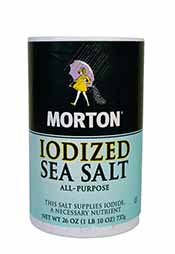
Notably, iodine is the most significant mineral in seaweeds. And just one gram of a seaweed sheet can contain up to 1900% of the RDA.
However, the amount of iodine varies a lot depending on the type of seaweed and the environment in which it grows (23).
Although there are other foods which are high in iodine, kelp is the most reliable source in the world.
And this mineral is crucial for our health.
Health Benefits
- Regulates hormones and supports hormonal balance (24)
- Supports optimal immune function (25)
- Essential for healthy hair, nails, and skin (26)
- Exerts cancer-protective effects, particularly for cancers of the digestive tract (27)
- Protects the thyroid and our body from radiation exposure (28)
- Manages energy levels and has a strong influence on mood (29)
As can be seen, iodine plays a major role in the health of our whole body.
But another key point is that many people are deficient in iodine, and this deficiency can have serious adverse effects.
Harms of Iodine Deficiency
Unfortunately, iodine deficiency is increasingly common in modern society.
Iodine deficiency is the world’s most common, yet easily preventable, cause of brain damage.
– World Health Organization
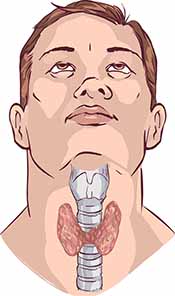
In fact, the World Health Organization estimate that 2 billion people worldwide are at risk (30).
And iodine deficiency can be devastating:
- Iodine deficiency has close links to an increased likelihood of depression and other mental health issues (31).
- It can lead to hypothyroidism, a condition caused by an under-active thyroid that can cause fatigue, weight gain, and a slower heart rate. Adequate intake of iodine is necessary for optimal thyroid hormone production (32, 33).
- Lower immunity: as iodine is necessary for immune health, a lack of the mineral can cause immune deficiencies (34).
- In a worst-case scenario, severe prolonged iodine deficiency can lead to an enlarged heart, heart failure, and death (35).
Symptoms of Iodine Deficiency
Some of the symptoms to watch out for include (36):
- Brain fog: difficulty with thinking, making decisions, and trouble with comprehension.
- Cramps and muscular soreness
- Dry skin and thinning hair
- Fatigue
- Goiter: an enlargement of the thyroid, causing a big round bulge in the neck
- Physical weakness
- Extreme sensitivities to cold
However, if you are reading these and think the symptoms sound familiar, then see a doctor and don’t try to self-diagnose.
Iodine deficiency is a complex condition that requires tests to check thyroid levels.
Kelp Concerns and Potential Side Effects
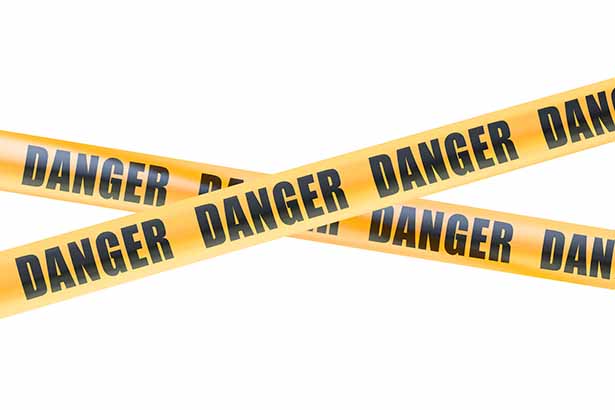
Similar to many things in life, too much of a good thing is possible when it comes to kelp.
The majority of this ‘danger’ comes from the possibility of overdosing on iodine since it’s present in such high quantities (37, 38).
And while a low iodine diet can be harmful, the same is true for too much iodine.
Eating vast quantities of kelp on a regular basis can suppress thyroid function and has a range of symptoms.
Some of these include (39):
- Abdominal pain
- Bloating
- Delerium
- Diarrhea
- Fever
- Lack of urine
- Hypothyroidism – excessive amounts can cause this condition just the same as low iodine can. Signs of hypothyroidism include fatigue, weight gain, and a higher risk for several diseases
A severe iodine overdose can cause iodine poisoning, which is very dangerous and may lead to shortness of breath, shock and even seizures (40).
Is Kelp Good For Weight Loss?
Kelp has many health benefits, and there’s a mountain of information going around that kelp is good for weight loss too.
But is that true? Well, yes and no.
While kelp has no miraculous ability to cause you to lose weight spontaneously, it may potentially help with weight loss indirectly.
To put it another way; if someone has an underactive thyroid, then weight struggles are very likely.
This happens because people with a low output of thyroid hormone tend to have a lower basal metabolic rate, meaning they burn less energy (41, 42).
Therefore, a higher intake of iodine can have a positive influence on thyroid function, normalize the basal metabolic rate, and lead to better fat burning.
Once again, if you believe you have a thyroid problem then don’t self-diagnose. See a specialist because thyroid issues are very complex.
Are Kelp Supplements a Good Choice?
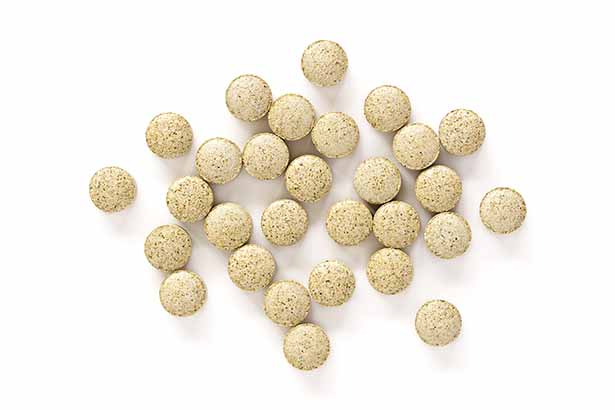
If you find it difficult to buy kelp–or don’t like the taste–then kelp supplements can be useful.
But if you’re going to supplement, then there are a few things of which you need to be aware.
Issues to Consider
The first thing to remember is that supplements are concentrated sources of iodine, and so there’s a much greater possibility for consuming excessive amounts.
Another key point is that kelp is known to contain trace amounts of arsenic. This contamination has caused problems in people attempting to self-medicate their thyroid issues (43, 44).
And in one case, a senior woman supplementing with kelp capsules had toxic levels of arsenic in her blood.
After discontinuing supplementation, the arsenic levels reached an undetectable level within weeks (45).
Benefits of Kelp Supplementation
- A convenient way to get the beneficial nutrients and health benefits of kelp
- It’s a standardized dose of iodine – you know how much you are taking
- Relatively cheap
Drawbacks/Side Effects
Kelp supplements are produced from real kelp, so there are no real “side effects” like there are with some synthetic drugs.
However, a couple of things to be aware of:
- In contrast to fresh kelp, it’s very easy to overdose on iodine with supplements — stick to the recommended dose.
- Some supplements have heavy metal contamination (such as arsenic). However, this is much the same as using fresh kelp or eating fish or rice. If you stick to the suggested dosage, then I wouldn’t worry too much.
Best Kelp Supplements
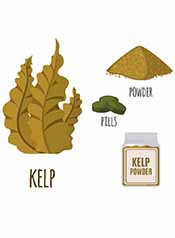
Personally, I think using fresh or dried kelp is the better option; it’s a real food, and there’s less risk of consuming too much iodine.
However, for those who prefer to supplement, there are many different options when it comes to kelp.
Some of these include:
- Sea kelp powder
- Iodine liquid (sometimes known as “liquid kelp”)
- Kelp tablets/pills
You can find these at your local health store. Otherwise, there is a range of these supplements on Amazon.
Dried Kelp
If you don’t have access to fresh kelp, and you don’t want to supplement–then dried kelp can be a great choice.
Dried kelp offers the same health benefits, and it looks like this:
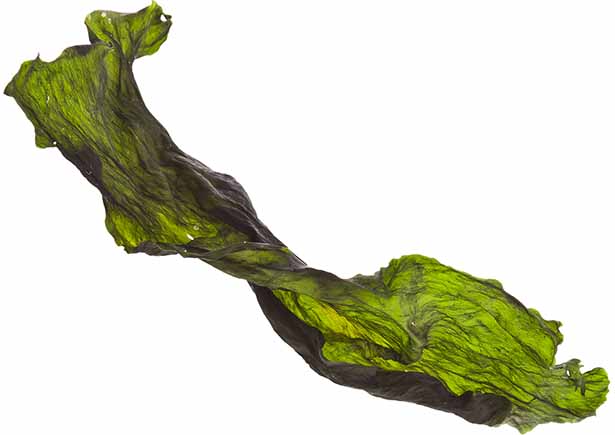
It re-hydrates when you boil it, and you can use it as part of stock for soup.
Kelp also tastes great, and you can use it in a wide range of dishes.
Do you have a local Asian market near you?
As it’s a staple food in East Asia, buying it from one of these stores is much better value than buying from a specialist health store.
Japanese and Korean stores always carry it, and you can probably find it in any Chinese market too.
Kelp Noodles
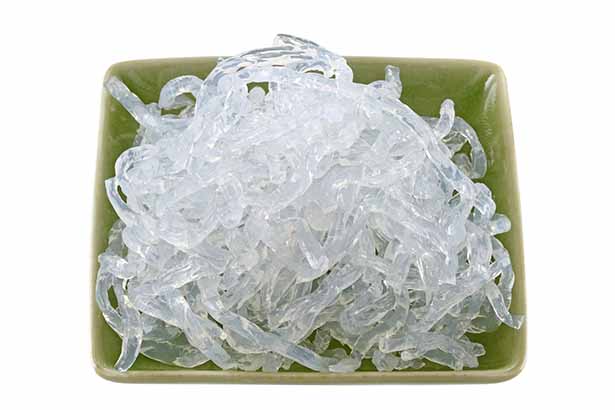
Another great way to get some kelp is through ‘kelp noodles,’ which you can use as a replacement for traditional wheat noodles.
On the positive side, not only are these noodles crammed full of nutrients, but they’re also very low in carbs and calories.
You can either eat them raw or cook them, and you can use them alone or as part of a recipe.
Similar to zoodles, they’re a much healthier choice than refined wheat-based noodles.
You can buy kelp noodles from a range of places; Asian markets and health stores have them, and general grocery stores might stock them if you’re lucky.
There is also a wide choice online.
Final Thoughts
Kelp is a nutrient-dense food that offers some unique compounds not available in any other food.
And as one of the most significant sources of iodine, it’s something that can benefit a lot of people.
While it’s not essential to be eating kelp (or other seaweeds), doing so is an excellent way to get lots of health-supportive nutrients into your diet.
And lastly, it tastes pretty good too.
Related Articles


